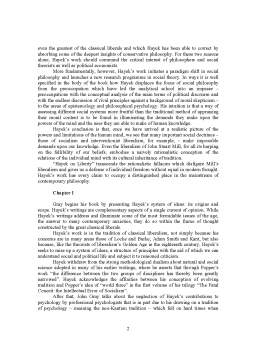Extras din referat
John N. Gray (born April 17, 1948) is a prominent British political philosopher and author, currently School Professor of European Thought at the London School of Economics.
Gray contributes regularly to The Guardian, New Statesman, and The Times Literary Supplement, and has written several influential books on political theory, including Straw Dogs: Thoughts on Humans and Other Animals (2003), an attack on humanism, a worldview which he sees as originating in religious ideologies. Gray sees volition, and hence morality, as an illusion, and portrays humanity as a rapacious species engaged in wiping out other forms of life while destroying its natural environment.
Friedrich August von Hayek was an Austrian-British economist and political philosopher known for his defense of liberal democracy and free-market capitalism against socialist and collectivist thought in the mid-20th century. He is considered to be one of the most important economists and political philosophers of the twentieth century. One of the most influential members of the Austrian School of economics, he also made significant contributions in the fields of cognitive science. He shared the 1974 Nobel Prize in Economics with ideological rival Gunnar Myrdal "for their pioneering work in the theory of money and economic fluctuations and for their penetrating analysis of the interdependence of economic, social and institutional phenomena.". He also received the U.S. Presidential Medal of Freedom in 1991.
John Gray’s “Hayek on Liberty” is structured on these six chapters:
Chapter I: Hayek’s System of Ideas: its Origins and Scope;
Chapter II: The Idea of a Spontaneous Social Order;
Chapter III: The Law of Liberty;
Chapter IV: Economic Theory and Public Policy;
Chapter V: Some Contrasts and Comparisons;
Chapter VI: Assessment and Criticism.
Though Hayek’s central place in twentieth-century economic thought is uncontested, his general philosophy has yet to receive the sustained critical attention it merits. A major theme of this study is that Hayek’s work composes a system of ideas, fully as ambitions as the system of Mill and Marx, but far less vulnerable to criticism than theirs because it is grounded on a philosophically defensible view of the and limits of human reason. A related claim made in this study is that we find in Hayek a restatement of classical liberalism in which it is purified of errors – specifically, the errors of abstract individualism and uncritical rationalism – which inform the work of even the greatest of the classical liberals and which Hayek has been able to correct by absorbing some of the deepest insights of conservative philosophy. For these two reasons alone, Hayek’s work should command the critical interest of philosophers and social theorists as well as political economists.
More fundamentally, however, Hayek’s work initiates a paradigm shift in social philosophy and launches a new research programme in social theory. In ways it is well specified in the body of the book how Hayek displaces the focus of social philosophy from the preoccupation which have led the analytical school into an impasse – preoccupations with the conceptual analysis of the main terms of political discourse and with the endless discussion of rival principles against a background of moral skepticism – to the areas of epistemology and philosophical psychology. His intuition is that a way of assessing different social systems more fruitful than the traditional method of appraising their moral content is to be found in illuminating the demands they make upon the powers of the mind and the uses they are able to make of human knowledge.
Hayek’s conclusion is that, once we have arrived at a realistic picture of the powers and limitations of the human mind, we see that many important social doctrines – those of socialism and interventionist liberalism, for example, - make impossible demands upon our knowledge. Even the liberalism of John Stuart Mill, for all its harping on the fallibility of our beliefs, embodies a naively rationalistic conception of the relations of the individual mind with its cultural inheritance of tradition.
“Hayek on Liberty” transcends the rationalistic fallacies which disfigure Mill’s liberalism and gives us a defense of individual freedom without equal in modern thought. Hayek’s work has every claim to occupy a distinguished place in the mainstream of contemporary philosophy.
Chapter I
Gray begins his book by presenting Hayek’s system of ideas: its origins and scope. Hayek’s writings are complementary aspects of a single current of opinion. While Hayek’s writings address and illuminate some of the most formidable issues of the age, the answer to many contemporary anxieties, they do so within the frame of thought constructed by the great classical liberals.
Hayek’s work is in the tradition of classical liberalism, not simply because his concerns are in many areas those of Locke and Burke, Adam Smith and Kant, but also because, like the theorists of liberalism’s Golden Age in the eighteenth century, Hayek’s seeks to raise up a system of ideas, a structure of principles with the aid of which we can understand social and political life and subject it to reasoned criticism.
Hayek withdraw from the strong methodological dualism about natural and social science adopted in many of his earlier writings, where he asserts that through Popper’s work “the difference between the two groups of disciplines has thereby been greatly narrowed”. Hayek acknowledges the affinities between his conception of evolving tradition and Popper’s idea of “world three” in the first volume of his trilogy “The Fatal Conceit: the Intellectual Error of Socialism”.
Preview document
Conținut arhivă zip
- Hayek on Liberty.doc














